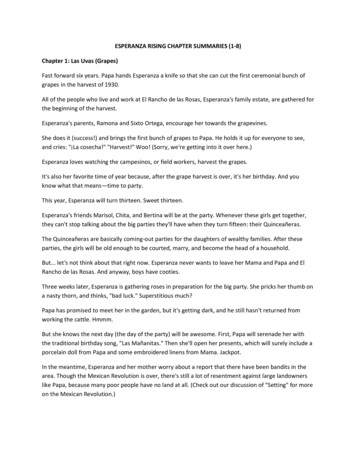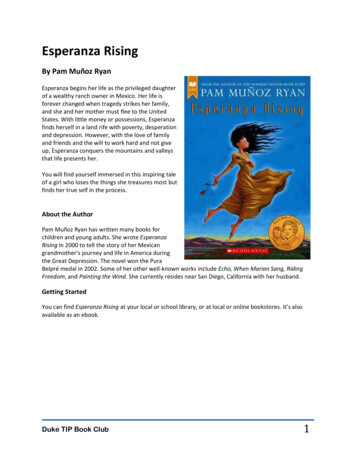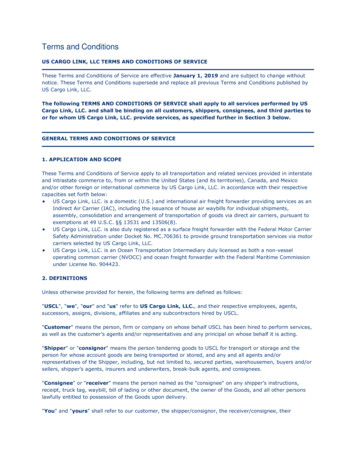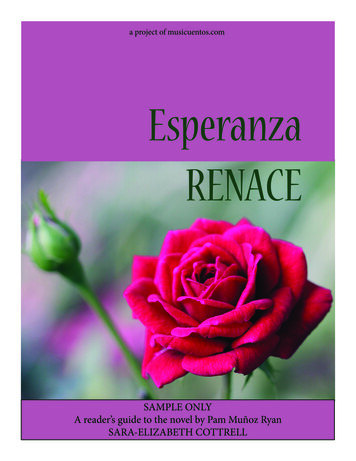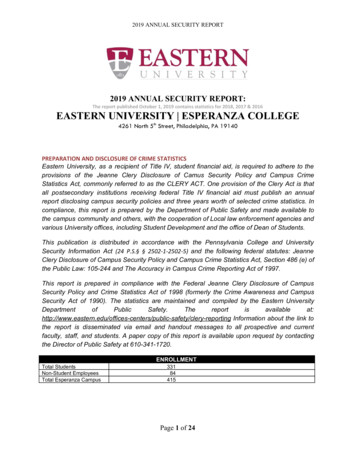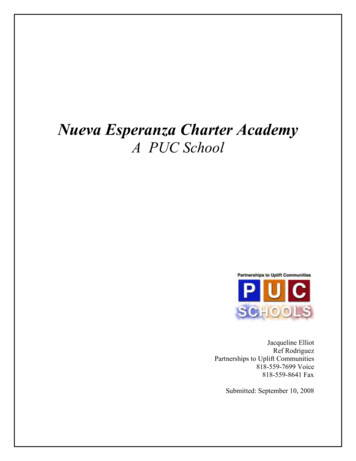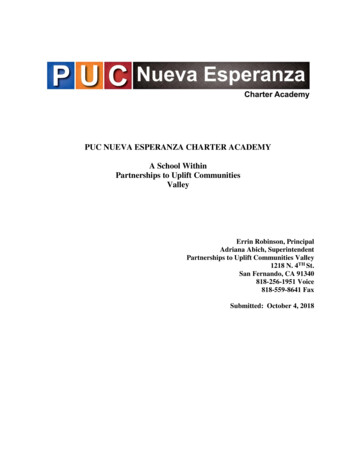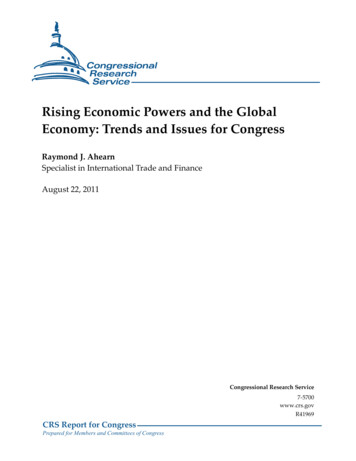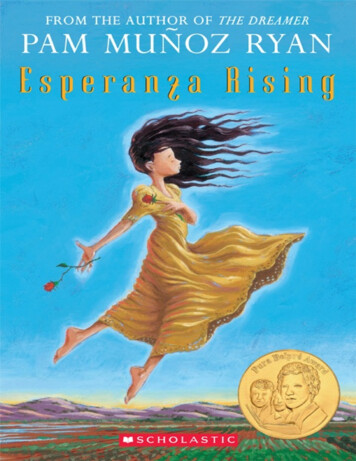
Transcription
TO THE MEMORY OFESPERANZA ORTEGA MUÑOZ HERNANDEZ ELGART,MI ABUELITA.BASKETS OF GRAPES TO MY EDITOR,TRACY MACK, FOR PATIENTLY WAITINGFOR FRUIT TO FALL.ROSES TO OZELLA BELL, JESS MARQUEZ,DON BELL, AND HOPE MUÑOZ BELLFOR SHARING THEIR STORIES.SMOOTH STONES AND YARN DOLLS TOISABEL SCHON, PH.D., LETICIA GUADARRAMA,TERESA MLAWER, AND MACARENA SALASFOR THEIR EXPERTISE AND ASSISTANCE.
Table of ContentsTitle PageDedicationEpigraphAguascalientes, Mexico 1924Las Uvas Grapes Six Years LaterLas Papayas PapayasLos Higos FigsLas Guayabas GuavasLos Melones CantaloupesLas Cebollas OnionsLas Almendras AlmondsLas Ciruelas PlumsLas Papas PotatoesLos Aguacates AvocadosLos Espárragos AsparagusLos Duraznos PeachesLas Uvas GrapesAuthor’s NoteAfter WordsAbout the AuthorQ&A with Pam Muñoz RyanMake Your Own Jamaica Flower Punch (Hibiscus Flower Punch)Making Mama's Yarn DollThose Familiar SayingsWhat Story Do You Have to Tell?A Sneak Peek at Becoming Naomi LeonCopyright
Aquel que hoy se cae, se levantará mañana.He who falls today may rise tomorrow.Es más rico el rico cuando empobrece queel pobre cuando enriquece.The rich person is richer when hebecomes poor, than the poor personwhen he becomes rich.— MEXICAN PROVERBS
land is alive, Esperanza,” said Papa, taking her small hand as they walked through the gentle“Ourslopesof the vineyard. Leafy green vines draped the arbors and the grapes were ready to drop.Esperanza was six years old and loved to walk with her papa through the winding rows, gazing up at himand watching his eyes dance with love for the land.“This whole valley breathes and lives,” he said, sweeping his arm toward the distant mountains thatguarded them. “It gives us the grapes and then they welcome us.” He gently touched a wild tendril thatreached into the row, as if it had been waiting to shake his hand. He picked up a handful of earth andstudied it. “Did you know that when you lie down on the land, you can feel it breathe? That you can feelits heart beating?”“Papi, I want to feel it,” she said.“Come.” They walked to the end of the row, where the incline of the land formed a grassy swell.Papa lay down on his stomach and looked up at her, patting the ground next to him.Esperanza smoothed her dress and knelt down. Then, like a caterpillar, she slowly inched flat next tohim, their faces looking at each other. The warm sun pressed on one of Esperanza’s cheeks and the warmearth on the other.She giggled.“Shhh,” he said. “You can only feel the earth’s heartbeat when you are still and quiet.”She swallowed her laughter and after a moment said, “I can’t hear it, Papi.”“Aguántate tantito y la fruta caerá en tu mano,” he said. “Wait a little while and the fruit will fallinto your hand. You must be patient, Esperanza.”She waited and lay silent, watching Papa’s eyes.And then she felt it. Softly at first. A gentle thumping. Then stronger. A resounding thud, thud, thudagainst her body.She could hear it, too. The beat rushing in her ears. Shoomp, shoomp, shoomp.She stared at Papa, not wanting to say a word. Not wanting to lose the sound. Not wanting to forget thefeel of the heart of the valley.She pressed closer to the ground, until her body was breathing with the earth’s. And with Papa’s. Thethree hearts beating together.She smiled at Papa, not needing to talk, her eyes saying everything.And his smile answered hers. Telling her that he knew she had felt it.
Papa handed Esperanza the knife. The short blade was curved like a scythe, its fat wooden handlefitting snugly in her palm. This job was usually reserved for the eldest son of a wealthy rancher, but sinceEsperanza was an only child and Papa’s pride and glory, she was always given the honor. Last night shehad watched Papa sharpen the knife back and forth across a stone, so she knew the tool was edged like arazor.“Cuídate los dedos,” said Papa. “Watch your fingers.”The August sun promised a dry afternoon in Aguascalientes, Mexico. Everyone who lived and workedon El Rancho de las Rosas was gathered at the edge of the field: Esperanza’s family, the house servants intheir long white aprons, the vaqueros already sitting on their horses ready to ride out to the cattle, andfifty or sixty campesinos, straw hats in their hands, holding their own knives ready. They were coveredtop to bottom, in long-sleeved shirts, baggy pants tied at the ankles with string, and bandanas wrappedaround their foreheads and necks to protect them from the sun, dust, and spiders. Esperanza, on the otherhand, wore a light silk dress that stopped above her summer boots, and no hat. On top of her head a widesatin ribbon was tied in a big bow, the tails trailing in her long black hair.The clusters were heavy on the vine and ready to deliver. Esperanza’s parents, Ramona and SixtoOrtega, stood nearby, Mama, tall and elegant, her hair in the usual braided wreath that crowned her head,and Papa, barely taller than Mama, his graying mustache twisted up at the sides. He swept his handtoward the grapevines, signaling Esperanza. When she walked toward the arbors and glanced back at herparents, they both smiled and nodded, encouraging her forward. When she reached the vines, sheseparated the leaves and carefully grasped a thick stem. She put the knife to it, and with a quick swipe, theheavy cluster of grapes dropped into her waiting hand. Esperanza walked back to Papa and handed himthe fruit. Papa kissed it and held it up for all to see.“¡La cosecha!” said Papa. “Harvest!”“¡Ole! ¡Ole!” A cheer echoed around them.The campesinos, the field-workers, spread out over the land and began the task of reaping the fields.Esperanza stood between Mama and Papa, with her arms linked to theirs, and admired the activity of theworkers.“Papi, this is my favorite time of year,” she said, watching the brightly colored shirts of the workersslowly moving among the arbors. Wagons rattled back and forth from the fields to the big barns where thegrapes would be stored until they went to the winery.“Is the reason because when the picking is done, it will be someone’s birthday and time for a bigfiesta?” Papa asked.
Esperanza smiled. When the grapes delivered their harvest, she always turned another year. This year,she would be thirteen. The picking would take three weeks and then, like every other year, Mama andPapa would host a fiesta for the harvest. And for her birthday.Marisol Rodríguez, her best friend, would come with her family to celebrate. Her father was a fruitrancher and they lived on the neighboring property. Even though their houses were acres apart, they metevery Saturday beneath the holm oak on a rise between the two ranches. Her other friends, Chita andBertina, would be at the party, too, but they lived farther away and Esperanza didn’t see them as often.Their classes at St. Francis didn’t start again until after the harvest and she couldn’t wait to see them.When they were all together, they talked about one thing: their Quinceañeras, the presentation parties theywould have when they turned fifteen. They still had two more years to wait, but so much to discuss — thebeautiful white gowns they would wear, the big celebrations where they would be presented, and the sonsof the richest families who would dance with them. After their Quinceañeras, they would be old enoughto be courted, marry, and become las patronas, the heads of their households, rising to the positions oftheir mothers before them. Esperanza preferred to think, though, that she and her someday-husband wouldlive with Mama and Papa forever. Because she couldn’t imagine living anywhere other than El Rancho delas Rosas. Or with any fewer servants. Or without being surrounded by the people who adored her.It had taken every day of three weeks to put the harvest to bed and now everyone anticipated thecelebration. Esperanza remembered Mama’s instructions as she gathered roses from Papa’s garden.“Tomorrow, bouquets of roses and baskets of grapes on every table.”Papa had promised to meet her in the garden and he never disappointed her. She bent over to pick a redbloom, fully opened, and pricked her finger on a vicious thorn. Big pearls of blood pulsed from the tip ofher thumb and she automatically thought, “bad luck.” She quickly wrapped her hand in the corner of herapron and dismissed the premonition. Then she cautiously clipped the blown rose that had wounded her.Looking toward the horizon, she saw the last of the sun disappear behind the Sierra Madre. Darknesswould settle quickly and a feeling of uneasiness and worry nagged at her.Where was Papa? He had left early that morning with the vaqueros to work the cattle. And he wasalways home before sundown, dusty from the mesquite grasslands and stamping his feet on the patio to getrid of the crusty dirt on his boots. Sometimes he even brought beef jerky that the cattlemen had made, butEsperanza always had to find it first, searching his shirt pockets while he hugged her.Tomorrow was her birthday and she knew that she would be serenaded at sunrise. Papa and the menwho lived on the ranch would congregate below her window, their rich, sweet voices singing LasMañanitas, the birthday song. She would run to her window and wave kisses to Papa and the others, thendownstairs she would open her gifts. She knew there would be a porcelain doll from Papa. He had given
her one every year since she was born. And Mama would give her something she had made: linens,camisoles or blouses embroidered with her beautiful needlework. The linens always went into the trunk atthe end of her bed for algún día, for someday.Esperanza’s thumb would not stop bleeding. She picked up the basket of roses and hurried from thegarden, stopping on the patio to rinse her hand in the stone fountain. As the water soothed her, she lookedthrough the massive wooden gates that opened onto thousands of acres of Papa’s land.Esperanza strained her eyes to see a dust cloud that meant riders were near and that Papa was finallyhome. But she saw nothing. In the dusky light, she walked around the courtyard to the back of the largeadobe and wood house. There she found Mama searching the horizon, too.“Mama, my finger. An angry thorn stabbed me,” said Esperanza.“Bad luck,” said Mama, confirming the superstition, but she half-smiled. They both knew that bad luckcould mean nothing more than dropping a pan of water or breaking an egg.Mama put her arms around Esperanza’s waist and both sets of eyes swept over the corrals, stables, andservants’ quarters that sprawled in the distance. Esperanza was almost as tall as Mama and everyone saidshe would someday look just like her beautiful mother. Sometimes, when Esperanza twisted her hair ontop of her head and looked in the mirror, she could see that it was almost true. There was the same blackhair, wavy and thick. Same dark lashes and fair, creamy skin. But it wasn’t precisely Mama’s face,because Papa’s eyes were there too, shaped like fat, brown almonds.“He is just a little late,” said Mama. And part of Esperanza’s mind believed her. But the other partscolded him.“Mama, the neighbors warned him just last night about bandits.”Mama nodded and bit the corner of her lip in worry. They both knew that even though it was 1930 andthe revolution in Mexico had been over for ten years, there was still resentment against the largelandowners.“Change has not come fast enough, Esperanza. The wealthy still own most of the land while some of thepoor have not even a garden plot. There are cattle grazing on the big ranches yet some peasants are forcedto eat cats. Papa is sympathetic and has given land to many of his workers. The people know that.”“But Mama, do the bandits know that?”“I hope so,” said Mama quietly. “I have already sent Alfonso and Miguel to look for him. Let’s waitinside.”Tea was ready in Papa’s study and so was Abuelita.“Come, mi nieta, my granddaughter,” said Abuelita, holding up yarn and crochet hooks. “I am starting anew blanket and will teach you the zigzag.”
Esperanza’s grandmother, whom everyone called Abuelita, lived with them and was a smaller, older,more wrinkled version of Mama. She looked very distinguished, wearing a respectable black dress, thesame gold loops she wore in her ears every day, and her white hair pulled back into a bun at the nape ofher neck. But Esperanza loved her more for her capricious ways than for her propriety. Abuelita mighthost a group of ladies for a formal tea in the afternoon, then after they had gone, be found wanderingbarefoot in the grapes, with a book in her hand, quoting poetry to the birds. Although some things werealways the same with Abuelita — a lace-edged handkerchief peeking out from beneath the sleeve of herdress — others were surprising: a flower in her hair, a beautiful stone in her pocket, or a philosophicalsaying salted into her conversation. When Abuelita walked into a room, everyone scrambled to make hercomfortable. Even Papa would give up his chair for her.Esperanza complained, “Must we always crochet to take our minds off worry?” She sat next to hergrandmother anyway, smelling her ever-present aroma of garlic, face powder, and peppermint.“What happened to your finger?” asked Abuelita.“A big thorn,” said Esperanza.Abuelita nodded and said thoughtfully, “No hay rosa sin espinas. There is no rose without thorns.”Esperanza smiled, knowing that Abuelita wasn’t talking about flowers at all but that there was no lifewithout difficulties. She watched the silver crochet needle dance back and forth in her grandmother’shand. When a strand of hair fell into her lap, Abuelita picked it up and held it against the yarn and stitchedit into the blanket.“Esperanza, in this way my love and good wishes will be in the blanket forever. Now watch. Tenstitches up to the top of the mountain. Add one stitch. Nine stitches down to the bottom of the valley. Skipone.”Esperanza picked up her own crochet needle and copied Abuelita’s movements and then looked at herown crocheting. The tops of her mountains were lopsided and the bottoms of her valleys were all bunchedup.Abuelita smiled, reached over, and pulled the yarn, unraveling all of Esperanza’s rows. “Do not beafraid to start over,” she said.Esperanza sighed and began again with ten stitches.Softly humming, Hortensia, the housekeeper, came in with a plate of small sandwiches. She offered oneto Mama.“No, thank you,” said Mama.Hortensia set the tray down and brought a shawl and wrapped it protectively around Mama’s shoulders.Esperanza couldn’t remember a time when Hortensia had not taken care of them. She was a ZapotecIndian from Oaxaca, with a short, solid figure and blue-black hair in a braid down her back. Esperanzawatched the two women look out into the dark and couldn’t help but think that Hortensia was almost theopposite of Mama.
“Don’t worry so much,” said Hortensia. “Alfonso and Miguel will find him.”Alfonso, Hortensia’s husband, was el jefe, the boss, of all the field-workers and Papa’s compañero, hisclose friend and companion. He had the same dark skin and small stature as Hortensia, and Esperanzathought his round eyes, long eyelids, and droopy mustache made him look like a forlorn puppy. He wasanything but sad, though. He loved the land as Papa did and it had been the two of them, working side byside, who had resurrected the neglected rose garden that had been in the family for generations. Alfonso’sbrother worked in the United States so Alfonso always talked about going there someday, but he stayed inMexico because of his attachment to Papa and El Rancho de las Rosas.Miguel was Alfonso and Hortensia’s son, and he and Esperanza had played together since they werebabies. At sixteen, he was already taller than both of his parents. He had their dark skin and Alfonso’sbig, sleepy eyes, and thick eyebrows that Esperanza always thought would grow into one. It was true thathe knew the farthest reaches of the ranch better than anyone. Since Miguel was a young boy, Papa hadtaken him to parts of the property that even Esperanza and Mama had never seen.When she was younger, Esperanza used to complain, “Why does he always get to go and not me?”Papa would say, “Because he knows how to fix things and he is learning his job.”Miguel would look at her and before riding off with Papa, he would give her a taunting smile. But whatPapa said was true, too. Miguel had patience and quiet strength and could figure out how to fix anything:plows and tractors, especially anything with a motor.Several years ago, when Esperanza was still a young girl, Mama and Papa had been discussing boysfrom “good families” whom Esperanza should meet someday. She couldn’t imagine being matched withsomeone she had never met. So she announced, “I am going to marry Miguel!”Mama had laughed at her and said, “You will feel differently as you get older.”“No, I won’t,” Esperanza had said stubbornly.But now that she was a young woman, she understood that Miguel was the housekeeper’s son and shewas the ranch owner’s daughter and between them ran a deep river. Esperanza stood on one side andMiguel stood on the other and the river could never be crossed. In a moment of self-importance,Esperanza had told all of this to Miguel. Since then, he had spoken only a few words to her. When theirpaths crossed, he nodded and said politely, “Mi reina, my queen,” but nothing more. There was no teasingor laughing or talking about every little thing. Esperanza pretended not to care, though she secretly wishedshe had never told Miguel about the river.Distracted, Mama paced at the window, each step making a hollow tapping sound on the tile floor.Hortensia lit the lamps.The minutes passed into hours.“I hear riders,” said Mama, and she ran for the door.But it was only Tío Luis and Tío Marco, Papa’s older stepbrothers. Tío Luis was the bank presidentand Tío Marco was the mayor of the town. Esperanza didn’t care how important they were because she
did not like them. They were serious and gloomy and always held their chins too high. Tío Luis was theeldest and Tío Marco, who was a few years younger and not as smart, always followed his olderbrother’s lead, like un burro, a donkey. Even though Tío Marco was the mayor, he did everything TíoLuis told him to do. They were both tall and skinny, with tiny mustaches and white beards on just the tipsof their chins. Esperanza could tell that Mama didn’t like them either, but she was always polite becausethey were Papa’s family. Mama had even hosted parties for Tío Marco when he ran for mayor. Neitherhad ever married and Papa said it was because they loved money and power more than people. Esperanzathought it was because they looked like two underfed billy goats.“Ramona,” said Tío Luis. “We may have bad news. One of the vaqueros brought this to us.”He handed Mama Papa’s silver belt buckle, the only one of its kind, engraved with the brand of theranch.Mama’s face whitened. She examined it, turning it over and over in her hand. “It may mean nothing,”she said. Then, ignoring them, she turned toward the window and began pacing again, still clutching thebelt buckle.“We will wait with you in your time of need,” said Tío Luis, and as he passed Esperanza, he patted hershoulder and gave it a gentle squeeze.Esperanza stared after him. In her entire life, she couldn’t remember him ever touching her. Her uncleswere not like those of her friends. They never spoke to her, played or even teased her. In fact, they actedas if she didn’t exist at all. And for that reason, Tío Luis’s sudden kindness made her shiver with fear forPapa.Abuelita and Hortensia began lighting candles and saying prayers for the men’s safe return. Mama, withher arms hugging her chest, swayed back and forth at the window, never taking her eyes from the darkness.They tried to pass the time with small talk but their words dwindled into silence. Every sound of thehouse seemed magnified, the clock ticking, someone coughing, the clink of a teacup.Esperanza struggled with her stitches. She tried to think about the fiesta and all the presents she wouldreceive tomorrow. She tried to think of bouquets of roses and baskets of grapes on every table. She triedto think of Marisol and the other girls, giggling and telling stories. But those thoughts would only stay inher mind for a moment before transforming into worry, because she couldn’t ignore the throbbing sorenessin her thumb where the thorn had left its unlucky mark.It wasn’t until the candelabra held nothing but short stubs of tallow that Mama finally said, “I see alantern. Someone is coming!”They hurried to the courtyard and watched a distant light, a small beacon of hope swaying in thedarkness.The wagon came into view. Alfonso held the reins and Miguel the lantern. When the wagon stopped,Esperanza could see a body in back, completely covered with a blanket.“Where’s Papa?” she cried.
Miguel hung his head. Alfonso didn’t say a word but the tears running down his round cheeksconfirmed the worst.Mama fainted.Abuelita and Hortensia ran to her side.Esperanza felt her heart drop. A noise came from her mouth and slowly, her first breath of grief grewinto a tormented cry. She fell to her knees and sank into a dark hole of despair and disbelief.
“Estas son las mañanitas que cantaba el Rey Davida las muchachas bonitas; se las cantamos aquí.These are the morning songs which King David used to singto all the pretty girls; we sing them here to you.”Esperanza heard Papa and the others singing. They were outside her window and their voices wereclear and melodic. Before she was aware, she smiled because her first thought was that today was herbirthday. I should get up and wave kisses to Papa. But when she opened her eyes, she realized she wasin her parents’ bed, on Papa’s side that still smelled like him, and the song had been in her dreams. Whyhadn’t she slept in her own room? Then the events of last night wrenched her mind into reality. Her smilefaded, her chest tightened, and a heavy blanket of anguish smothered her smallest joy.Papa and his vaqueros had been ambushed and killed while mending a fence on the farthest reaches ofthe ranch. The bandits stole their boots, saddles, and horses. And they even took the beef jerky that Papahad hidden in his pockets for Esperanza.Esperanza got out of bed and wrapped un chal around her shoulders. The shawl felt heavier than usual.Was it the yarn? Or was her heart weighing her down? She went downstairs and stood in la sala, the largeentry hall. The house was empty and silent. Where was everyone? Then she remembered that Abuelita andAlfonso were taking Mama to see the priest this morning. Before she could call for Hortensia, there was aknocking at the front door.“Who is there?” called Esperanza through the door.“It is Señor Rodríguez. I have the papayas.”Esperanza opened the door. Marisol’s father stood before her, his hat in his hand. Beside him was a bigbox of papayas.“Your father ordered these from me for the fiesta today. I tried to deliver them to the kitchen but no oneanswered.”She stared at the man who had known Papa since he was a boy. Then she looked at the green papayasripening to yellow. She knew why Papa had ordered them. Papaya, coconut, and lime salad wasEsperanza’s favorite and Hortensia made it every year on her birthday.Her face crumbled. “Señor,” she said, choking back tears. “Have you not heard? My my papa isdead.”Señor Rodríguez stared blankly, then said, “¿Qué pasó, niña? What happened?”She took a quivery breath. As she told the story, she watched the grief twist Señor Rodríguez’s face andovertake him as he sat down on the patio bench, shaking his head. She felt as if she were in someoneelse’s body, watching a sad scene but unable to help.Hortensia walked out and put her arm around Esperanza. She nodded to Señor Rodríguez, then guided
Esperanza back up the stairs to the bedroom.“He ordered the pa papayas,” sobbed Esperanza.“I know,” whispered Hortensia, sitting next to her on the bed and rocking her back and forth. “I know.”The rosaries, masses, and funeral lasted three days. People whom Esperanza had never seen before cameto the ranch to pay their respects. They brought enough food to feed ten families every day, and so manyflowers that the overwhelming fragrance gave them all headaches and Hortensia finally put the bouquetsoutside.Marisol came with Señor and Señora Rodríguez several times. In front of the adults, Esperanzamodeled Mama’s refined manners, accepting Marisol’s condolences. But as soon as they could, the twogirls excused themselves and went to Esperanza’s room where they sat on her bed, held hands, and weptas one.The house was full of visitors and their polite murmurings during the day. Mama was cordial andattentive to everyone, as if entertaining them gave her a purpose. At night, though, the house emptied. Therooms seemed too big without Papa’s voice to fill them, and the echoes of their footsteps deepened theirsadness. Abuelita sat by Mama’s bed every night and stroked her head until she slept; then she wouldcome around to the other side and do the same for Esperanza. But soon after, Esperanza often woke toMama’s soft crying. Or Mama woke to hers. And then they held each other, without letting go, untilmorning.Esperanza avoided opening her birthday gifts. Every time she looked at the packages, they remindedher of the happy fiesta she was supposed to have. One morning, Mama finally insisted, saying, “Papawould have wanted it.”Abuelita handed Esperanza each gift and Esperanza methodically opened them and laid them back onthe table. A white purse for Sundays, with a rosary inside from Marisol. A rope of blue beads from Chita.The book, Don Quijote, from Abuelita. A beautiful embroidered dresser scarf from Mama, for someday.Finally, she opened the box she knew was the doll. She couldn’t help thinking that it was the last thingPapa would ever give her.Hands trembling, she lifted the lid and looked inside the box. The doll wore a fine white batiste dressand a white lace mantilla over her black hair. Her porcelain face looked wistfully at Esperanza withenormous eyes.“Oh, she looks like an angel,” said Abuelita, taking her handkerchief from her sleeve and blotting hereyes. Mama said nothing but reached out and touched the doll’s face.Esperanza couldn’t talk. Her heart felt so big and hurt so much that it crowded out her voice. Shehugged the doll to her chest and walked out of the room, leaving all the other gifts behind.
Tío Luis and Tío Marco came every day and went into Papa’s study to “take care of the family business.”At first, they stayed only a few hours, but soon they became like la calabaza, the squash plant inAlfonso’s garden, whose giant leaves spread out, encroaching upon anything smaller. The uncleseventually stayed each day until dark, taking all their meals at the ranch as well. Esperanza could tell thatMama was uneasy with their constant presence.Finally, the lawyer came to settle the estate. Mama, Esperanza, and Abuelita sat properly in their blackdresses as the uncles walked into the study.A little too loudly, Tío Luis said, “Ramona, grieving does not suit you. I hope you will not wear blackall year!”Mama did not answer but maintained her composure.They nodded to Abuelita but, as usual, said nothing to Esperanza.The talk began about bank loans and investments. It all seemed so complicated to Esperanza and hermind wandered. She had not been in this room since Papa died. She looked around at Papa’s desk andbooks, Mama’s basket of crocheting with the silver crochet hooks that Papa had bought her inGuadalajara, the table near the door that held Papa’s rose clippers and beyond the double doors, hisgarden. Her uncles’ papers were strewn across the desk. Papa never kept his desk that way. Tío Luis satin Papa’s chair as if it were his own. And then Esperanza noticed the belt buckle. Papa’s belt buckle onTío Luis’s belt. It was wrong. Everything was wrong. Tío Luis should not be sitting in Papa’s chair. Heshould not be wearing Papa’s belt buckle with the brand of the ranch on it! For the thousandth time, shewiped the tears that slipped down her face, but this time they were angry tears. A look of indignationpassed between Mama and Abuelita. Were they feeling the same?“Ramona,” said the lawyer. “Your husband, Sixto Ortega, left this house and all of its contents to youand your daughter. You will also receive the yearly income from the grapes. As you know, it is notcustomary to leave land to women and since Luis was the banker on the loan, Sixto left the land to him.”“Which makes things rather awkward,” said Tío Luis. “I am the bank president and would like to liveaccordingly. Now that I own this beautiful land, I would like to purchase the house from you for thisamount.” He handed Mama a piece of paper.Mama looked at it and said, “This is our home. My husband meant for us to live here. And the house it is worth twenty times this much! So no, I will not sell. Besides, where would we live?”“I predicted you would say no, Ramona,” said Tío Luis. “And I have a solution to your livingarrangements. A proposal actually. One of marriage.”Who is he talking about? thought Esperanza. Who would marry him?He cleared his throat. “Of course, we would wait the appropriate amount of time out of respect for mybrother. One year is customary, is it not? Even you can see that with your beauty and reputation and my
position at the bank, we could be a very powerful couple. Did you know that I, too, have been thinking ofentering politics? I am going to campaign for governor. And what woman would not want to be thegovernor’s wife?”Esperanza could not believe what she heard. Mama marry Tío Luis? Marry a goat? She looked wideeyed at him, then at Mama.Mama’s face looked as if it were in terrible pain. She stood up and spoke slowly and deliberately. “Ihave no desire to marry you, Luis, now or ever. Frankly, your offer offends me.”Tío Luis’s face hardened like a rock and the muscles twitched in his narrow n
Mar 22, 2020 · The warm sun pressed on one of Esperanza’s cheeks and the warm . , the heads of their households, rising to the positions of their mothers before them. Esperanza preferred to think, though, that she and her someday-husband would live with Mama and Papa forever. Because she couldn’t imag
